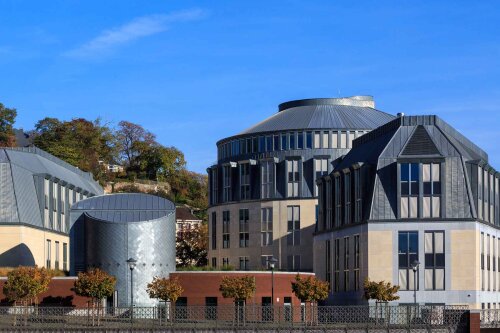Best Agriculture Lawyers in Liège
Share your needs with us, get contacted by law firms.
Free. Takes 2 min.
List of the best lawyers in Liège, Belgium
About Agriculture Law in Liège, Belgium
Agriculture is a significant sector in Liège, a province situated in the Walloon Region of Belgium. The fertile land, favorable climate, and rich agricultural tradition make Liège an active hub for farming, animal husbandry, horticulture, and related agro-industries. Agriculture in Liège operates under a mix of Belgian national law and regional Walloon decrees, while also adhering to regulations set by the European Union. The sector supports rural employment and is subject to various standards on land use, environmental sustainability, animal welfare, and food safety. As the sector evolves with technological developments and environmental challenges, legal guidance becomes increasingly essential for those involved in agriculture.
Why You May Need a Lawyer
There are several situations where individuals or businesses involved in agriculture in Liège may benefit from legal support. Some of the most common scenarios include:
- Buying, selling, or leasing agricultural land or property
- Understanding subsidies, grants, and other forms of state or EU support
- Complying with environmental regulations concerning pesticides, waste management, or conservation
- Resolving disputes with neighbors over land borders, water rights, or farming practices
- Handling employment matters such as contracts, seasonal work, and worker rights
- Dealing with succession, inheritance, or transfer of farming businesses across generations
- Defending against claims or inspections related to animal welfare or food safety regulations
- Negotiating or drafting contracts with suppliers, distributors, or cooperatives
Because the legal landscape is complex and often changes, consulting a specialist can prevent costly mistakes and ensure compliance.
Local Laws Overview
Agricultural activities in Liège must comply with several levels of law. Key aspects include:
- Land Use and Zoning: Municipalities in Liège regulate agricultural land through zoning plans, specifying what activities are allowed and where. Understanding zone restrictions is crucial before buying or changing the use of land.
- Environmental Protection: The Walloon Region has strict environmental rules to prevent pollution, control pesticide and fertilizer usage, and promote biodiversity. Farmers must often file environmental impact assessments for larger operations.
- Animal Welfare: Belgium enforces EU and national laws to guarantee proper treatment, housing, and transport of livestock, with regular inspections and penalties for non-compliance.
- Subsidies and Financial Aid: Farmers can seek EU and Belgian financial support, but must comply with eligibility criteria and report on their use of funds.
- Food Safety: Production, processing, and distribution of food are closely regulated. The Federal Agency for the Safety of the Food Chain (AFSCA) oversees these controls.
- Contracts and Cooperatives: Farming often involves multiple parties. Written, legally binding agreements are essential, especially within cooperatives or between suppliers and buyers.
Local regulations can be detailed, so seeking professional advice is recommended before significant business decisions.
Frequently Asked Questions
What are the main crops and livestock found in Liège?
Liège farms grow cereals, potatoes, sugar beets, and a variety of vegetables. Dairy and cattle farming are also common, along with pig and poultry farming.
Do I need a special permit to farm in Liège?
Starting most farming activities does not require a specific permit, but certain operations such as large livestock farms, biogas plants, or changes to land use may need environmental or municipal approval.
How do agricultural subsidies work in Liège?
Most subsidies are administered at the Walloon regional level, often financed by the EU Common Agricultural Policy. Farmers must apply, meet eligibility, and comply with ongoing requirements.
What are my obligations regarding environmental protection?
Farmers must follow regulations on fertilizer and pesticide use, waste management, conservation of natural habitats, and water protection. Non-compliance can result in fines or restrictions.
How do I transfer my farm to a family member?
The procedure involves inheritance or donation, subject to Belgian succession law. You may be eligible for favorable tax rates if the transfer is to family actively involved in the business.
Are there special rules for hiring seasonal workers?
Yes, employment of seasonal workers requires respect for minimum wage, maximum working hours, and social security declarations. Paperwork and contracts must be properly managed.
What should I do if a neighbor disputes my property boundary?
First, consult your title deeds and cadastral records. If a resolution cannot be reached, a surveyor or mediator may be needed, and legal action may follow as a last resort.
Am I required to join an agricultural cooperative?
No, joining a cooperative is voluntary, but many farmers choose to do so for better access to markets, shared equipment, and collective bargaining.
How are food safety regulations enforced?
The AFSCA inspects farms, slaughterhouses, and food processing facilities to ensure compliance. Regular checks and traceability protocols are enforced.
Where can I find legal help specific to agriculture?
You can consult specialized agricultural lawyers, notaries, or legal departments of farm unions and chambers of agriculture. Governmental information points can also provide guidance.
Additional Resources
Several organizations and governmental bodies assist those involved in agriculture in Liège:
- Walloon Agricultural Federation (FWA): Offers legal advice, representation, and training for farmers.
- Public Service of Wallonia - Agriculture Department: Provides information about permits, subsidies, and regulations.
- Federal Agency for the Safety of the Food Chain (AFSCA): Ensures food safety from farm to table.
- Liège Provincial Chamber of Agriculture: Supports agricultural businesses and mediation services.
- Farmers' Syndicates: Help with legal disputes, collective bargaining, and regulatory updates.
- Notaries and Agricultural Law Specialists: Offer guidance on land transfers, inheritance, and contract law.
Next Steps
If you need legal assistance related to agriculture in Liège, consider these steps:
- Clearly define your situation or problem. Gather all relevant documents, such as contracts, land records, or correspondence.
- Contact one of the above-mentioned organizations for initial guidance or referrals.
- Consult a lawyer who specializes in agricultural law or a notary experienced in rural matters. Many professionals offer an initial consultation to help you understand your options and likely costs.
- If your issue involves an official authority, follow the required administrative procedures and meet all deadlines.
- Document all interactions and agreements for future reference.
Taking these proactive steps can help safeguard your business, property, and rights while ensuring compliance with local, regional, and European laws.
Lawzana helps you find the best lawyers and law firms in Liège through a curated and pre-screened list of qualified legal professionals. Our platform offers rankings and detailed profiles of attorneys and law firms, allowing you to compare based on practice areas, including Agriculture, experience, and client feedback.
Each profile includes a description of the firm's areas of practice, client reviews, team members and partners, year of establishment, spoken languages, office locations, contact information, social media presence, and any published articles or resources. Most firms on our platform speak English and are experienced in both local and international legal matters.
Get a quote from top-rated law firms in Liège, Belgium — quickly, securely, and without unnecessary hassle.
Disclaimer:
The information provided on this page is for general informational purposes only and does not constitute legal advice. While we strive to ensure the accuracy and relevance of the content, legal information may change over time, and interpretations of the law can vary. You should always consult with a qualified legal professional for advice specific to your situation.
We disclaim all liability for actions taken or not taken based on the content of this page. If you believe any information is incorrect or outdated, please contact us, and we will review and update it where appropriate.












